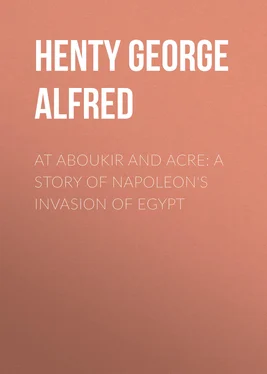George Henty - At Aboukir and Acre - A Story of Napoleon's Invasion of Egypt
Здесь есть возможность читать онлайн «George Henty - At Aboukir and Acre - A Story of Napoleon's Invasion of Egypt» — ознакомительный отрывок электронной книги совершенно бесплатно, а после прочтения отрывка купить полную версию. В некоторых случаях можно слушать аудио, скачать через торрент в формате fb2 и присутствует краткое содержание. Издательство: Иностранный паблик, Жанр: foreign_children, foreign_antique, foreign_prose, на английском языке. Описание произведения, (предисловие) а так же отзывы посетителей доступны на портале библиотеки ЛибКат.
- Название:At Aboukir and Acre: A Story of Napoleon's Invasion of Egypt
- Автор:
- Издательство:Иностранный паблик
- Жанр:
- Год:неизвестен
- ISBN:нет данных
- Рейтинг книги:5 / 5. Голосов: 1
-
Избранное:Добавить в избранное
- Отзывы:
-
Ваша оценка:
- 100
- 1
- 2
- 3
- 4
- 5
At Aboukir and Acre: A Story of Napoleon's Invasion of Egypt: краткое содержание, описание и аннотация
Предлагаем к чтению аннотацию, описание, краткое содержание или предисловие (зависит от того, что написал сам автор книги «At Aboukir and Acre: A Story of Napoleon's Invasion of Egypt»). Если вы не нашли необходимую информацию о книге — напишите в комментариях, мы постараемся отыскать её.
At Aboukir and Acre: A Story of Napoleon's Invasion of Egypt — читать онлайн ознакомительный отрывок
Ниже представлен текст книги, разбитый по страницам. Система сохранения места последней прочитанной страницы, позволяет с удобством читать онлайн бесплатно книгу «At Aboukir and Acre: A Story of Napoleon's Invasion of Egypt», без необходимости каждый раз заново искать на чём Вы остановились. Поставьте закладку, и сможете в любой момент перейти на страницу, на которой закончили чтение.
Интервал:
Закладка:
Here they leapt from their horses in front of a group of black tents. The oasis was of small extent, extending but two hundred yards across. In the centre was a group of thirty or forty palm-trees. Near these the herbage was thick, gradually dwindling away until it became lost in the sand. In the centre, near the tents, was a well, an irregularly-shaped pit some five-and-twenty feet deep, with a rough path down to it by which the women went to get water both for their own use and for that of the horses. A score of these were tethered on the grass.
"You are welcome to our tents," the sheik said; "may your visit be a fortunate one! Mulick," he called to one of the Arab boys, "take Beauty; but first," he went on to Edgar, "it were best that you talked to him a little, and gave him some sweets. He will soon get to love you, and it is well that he should hear your voice as often as possible."
"I will lead him out myself," Edgar replied, "and then Mulick can tether him. I shall know another time how to do it myself."
Then he patted the Arab's glossy neck, rubbed its ears, and praised it, giving it a handful of sweets while he did so. Beauty evidently appreciated the attentions, and replied to him by a low whinny. Then he took off its saddle and led it to a spot Mulick pointed out, and then watched the boy tether it, and took off the bridle and carried it back to the tents. A woman came out from the largest of these. She was not veiled, for except when they go into the towns the Bedouin women seldom conceal their faces.
"Ayala," the sheik said, "this is the young white lord who saved Sidi from those who attacked him; henceforth he is as one of our tribe."
"May the blessings of Allah fall upon you!" the woman said. "Sidi is our only child. Had he been taken from us our lives would have been desolate indeed."
"I am very glad that I happened to come along at the time," Edgar said. "It has been a most fortunate occurrence for me, as much indeed as for Sidi. I have no friends of my own age, and it will be great pleasure to me to have him as a sort of brother. I am sure that we shall get on capitally together. Besides which, your husband has given me a grand horse, such as I could never have obtained for money. Sidi will be able to teach me Arab ways, and I daresay I shall be able to show him something of our customs and life."
Edgar was now shown a tent that had been newly erected for his use. The furniture was simple, consisting only of a handsome Eastern carpet, which covered the ground, and a pile of rugs for sofa and bed. Hanging from one of the sticks that supported the tent was a porous jar of water. When he had hung up his rifle and pistols, powder-horn and bullet-pouch, its furnishing was complete.
"Is this all your tribe?" he asked Sidi, as he came out from his tent.
"Oh, no! our tribe dwells in a large oasis a hundred miles to the south, and fifty miles west of Cairo. There are other portions of the tribe dwelling not far from the same spot, and we can ride five hundred strong when we go to fight the Berbers of Morocco. But my father is only sheik of his section. There are generally but six tents left here to keep possession, and we are often away for months. We find that we can buy such goods as the tribe requires cheaper at Alexandria than at Cairo, where, indeed, we do not often go, for ill-blood exists between us and the authorities there, who ventured on some complaint to send out a party of Mamelukes against us. We beat them back handsomely, but had to leave our oasis for a time, as we could not withstand the force they would be sure to send against us. That was thirty years ago. They filled up our wells and cut down our palm-trees. The wells were soon cleared out again, and the palm groves have grown up. They have not interfered with us again, but even now we care not to visit Cairo, though it may be that the matter is altogether forgotten there."
Edgar remained a fortnight with his new friends, and enjoyed the life much. He took lessons from Sidi in hurling a lance, and discovered that it would need a long practice indeed to enable him to do so with the accuracy shown by the Arabs. He also practised with his rifles and pistols. When he left he gave a warm invitation to Sidi to come and stay with him. This, however, the Arab lad declined.
"I should not be comfortable in your European dwelling," he said. "I should be miserable, sitting on one of those chairs. Your father is busy, and so are you; I should be altogether out of my element."
"But I might have said the same thing here, Sidi?"
"Oh, no! it is easy to fling off restraint, to throw yourself on the sand, to ride and shoot and hurl the spear. Those are sports that you can enjoy as much as I do. I will come over often and see you, but do not ask me to stay."
Edgar saw that it was better not to press the matter, at any rate for the present. In time, when Sidi became more accustomed to European ways he might perhaps come to stay, but if he came now it would be a penance rather than a pleasure. After that time the young Arab rode over frequently, leaving his camp at daybreak and arriving in time to spend a long day with Edgar. Sometimes they rode together, sometimes walked along the sea-shore, and Sidi soon learned to enjoy as much as his friend a row or a sail on the water, which to him was at first altogether a novelty. The merchant possessed several boats, which he used in his business, and a pretty gig which carried a sail, in which he himself went off to visit ships which brought goods for him. This was at other times at Edgar's service. He had learned, even before going to school, to manage it, and it therefore was unnecessary to take anyone with them.
Sidi at first did not take kindly to an oar. Trained to hard exercise on horseback and in the sports of the tribe, he had yet a great aversion to anything like steady labour, and was unable even to understand Edgar's willingness to exert himself at an oar when he could have had men to row him about. In time, however, when he had mastered the initial difficulties of the art, he took to the exercise, and they often spent the whole day in the boat, either coasting along Aboukir Bay, or, more often, shooting on the lakes.
The arrival of the British fleet had created quite an excitement in Alexandria, and the news they brought, that a large French fleet had left Toulon, carrying many thousands of troops, destined, it was believed, to operate in Egypt, had caused an intense feeling of dismay among the British merchants settled there, and a corresponding exultation among the French.
"Will the French fleet be stronger than this?" Sidi asked, as he and Edgar leant on the parapet and looked at the long line of British ships.
"There may be more of them—very likely there are," Edgar said carelessly; "but that makes no matter, we are sure to thrash them. In the first place, we always do so somehow; and in the next, as our fleet is commanded by one of the best admirals we have, there is no fear of their being beaten. The only fear is that the fleet mayn't fall in with the French until they have landed their troops."
"The troops could not stand against our Mamelukes," Sidi said scornfully. "They would soon drive them into the sea."
"I am not so sure of that," Edgar said. "No doubt the Mamelukes are splendid horsemen. I suppose they are as good as any in the world; but horsemen cannot win a battle alone. The French infantry are very fine, and I doubt whether any number of horsemen could break their squares. Then their artillery is immensely superior to that of the Egyptians; that will give them a very great advantage."
"But if your fleet meets theirs and beats it, how could they ever get back again?"
"I expect they mean to stay here and hold the country," Edgar said. "I don't know what good it would do to them; still I suppose they think it would, or they would not take the trouble to come over. But if they should take the country, it would be very bad for men like my father, for they would be sure to put all the English in prison, and it would be the ruin of their business."
Читать дальшеИнтервал:
Закладка:
Похожие книги на «At Aboukir and Acre: A Story of Napoleon's Invasion of Egypt»
Представляем Вашему вниманию похожие книги на «At Aboukir and Acre: A Story of Napoleon's Invasion of Egypt» списком для выбора. Мы отобрали схожую по названию и смыслу литературу в надежде предоставить читателям больше вариантов отыскать новые, интересные, ещё непрочитанные произведения.
Обсуждение, отзывы о книге «At Aboukir and Acre: A Story of Napoleon's Invasion of Egypt» и просто собственные мнения читателей. Оставьте ваши комментарии, напишите, что Вы думаете о произведении, его смысле или главных героях. Укажите что конкретно понравилось, а что нет, и почему Вы так считаете.












